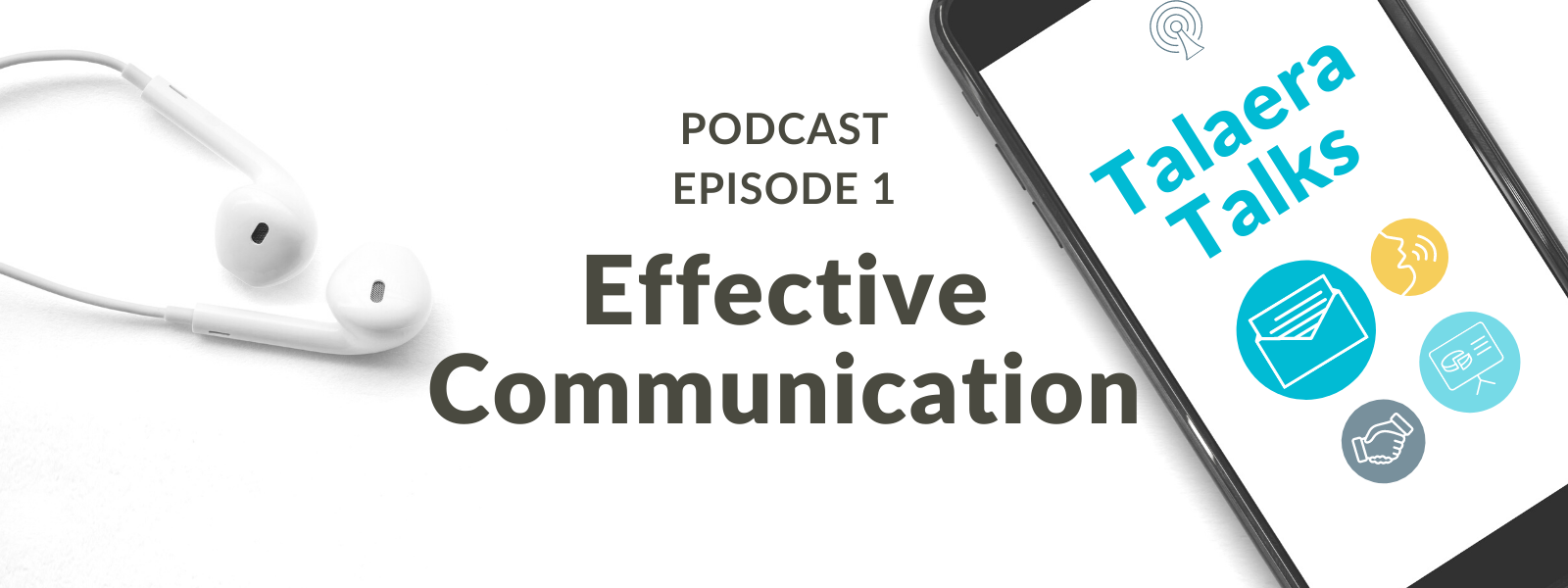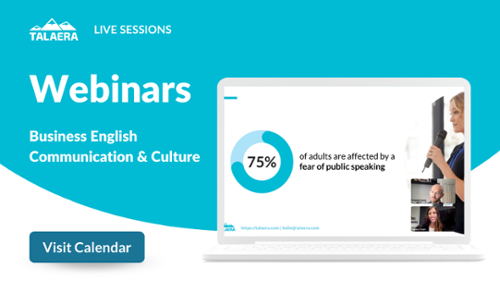By Talaera Team on Jan 14, 2021 12:35:04 PM
Talaera Talks is back with a new episode! Get communication advice and tips to express yourself effectively and with confidence in English in professional settings and ultimately ensure effective workplace communication. We've broken it down into three important blocks:
- #1 Being heard: Learn opening sentences, interrupt politely, and return to your topic at the right time
- #2 Being understood: Come in prepared, be concise, and check for understanding with these useful phrases
- #3 Influencing others: Beware of the culture, adapt your tone, and add power (because, rule of 3 and what next)
You can read the transcript below. To get podcast updates straight to your inbox, register here. We provide tips for those of you learning English and help you learn new English words and speak English fluently. Listen to it on your favorite platform:
Talaera Talks - Transcript Episode 1
- Topic: Effective Communication
- Listen: Spotify, Apple Podcasts, Google Podcasts
- Duration: 23:41
- Transcript: Read below
Intro
Welcome to Talaera Talks, the business English communication podcast for non-native professionals. My name is Paola and I am co hosting the show with Simon. In this podcast we're going to be covering communication advice and tips to help express yourself with confidence in English in professional settings. So we hope you enjoy the show!
0:25
Hi, everyone. Welcome to Talaera Talks the business English communication podcast for non-native speakers. We are Paola and Simon, business English instructors at Talaera. Hey Simon, how are you?
0:37
Hey, Paola, I'm doing well. How are you doing?
0:40
Good, very excited to get started.
0:42
Absolutely, absolutely. So what do we have for today?
0:47
Today's topic, is effective communication. But before we start, I actually want to ask that question. What does effective communication mean? And I think it's much more than exchanging information, right?
1:02
Yeah, absolutely. I mean, there's so much that goes into this topic, effective communication, right? What does this mean, "to get your point across," what is "communicating effectively" all about? It's kind of like the Golden Snitch we're all chasing. Right
1:20
Exactly. And, and I'm a language learner myself. And I remember when I learned French, I thought, I mean, I learned at school. And I thought I was pretty okay. And then I moved to Belgium, and it was not working. My my jokes fell flat. And I felt really dumb at some point, because I was a second too slow to communicate and, you know, it just didn't work. So what I would really love to do with you today, Simon, is nail it down, see what communication or effective communication really means. And we came up with these three things, these three aspects that will make you communicate effectively. Right, and they are: first one, being heard. The second one is being understood. And the third one is influencing others. So Simon, should we just give a few tips on how to be heard, be understood, and influence others?
2:19
Yeah, absolutely. I mean, there's so much we can do to get into that and cover those. But I think before we really get into that, let's discuss really quick, what are some things that may be stopping people from communicating effectively? I mean, we work with non-native speakers all the time. And I think we tend to see patterns and things that are holding people back, right.
2:46
Yeah. And I would say the main one is lack of confidence.
2:50
Yeah. Agreed. Agreed. I see that all the time.
2:53
Right?These people know very well what that what they're talking about. And when they speak in their native language, they they know exactly what to say and how to say it. But then when they speak in English, because they don't find that exact same word, then they feel insecure. So I would say that's the first one, the lack of confidence.
3:14
Yeah, definitely. For me, the lack of confidence, I see that all the time. And then, you know, because most of our learners, you know, they are really competent in whatever they're doing. I mean, that they want to be correct in how they're communicating. And, you know, because it is a skill, they want to be 100% perfect at that. And then yeah, you can I think a lot of times see people stress over grammar, or they want to find that perfect word. And I think this kind of stressing over those aspects really pulls back and leads into that confidence topic that that you were discussing.
3:57
Yes. And what you just said that stress over grammar and over not finding the right word... It doesn't let you really focus on what you want to say. So your brain is thinking about too many things. And it just short circuits, and it doesn't work. And then that's when you get stuck.
4:14
Yeah, absolutely. Absolutely. So yeah, I mean, we see that a lot. And hopefully today with a few of these points and tips. We'll be able to help with that.
4:27
Yeah. So that's it. I think we should start talking about those 1, 2, 3 we talked about - how to be heard, how to be understood, and how to influence others.
4:36
Absolutely. Do you want to start with number one being heard?
4:39
Yes, absolutely. So the first thing about being heard for non native English speakers is I always tell people learn opening sentences. And by learn opening sentences, I mean things like alright, I'd like to start off by checking the budget or Let me walk you through the sales figures? Or Shall I start with my team's proposal? Those fixed phrases, once you learn them, you've already had a nice start, and it will give you the confidence you need to then say whatever you want to say. So learn opening sentences. I also say, learn how to interrupt politely.
5:23
This is a tricky one, right?
5:25
It's a tricky one. It's hard. Sometimes you have to interrupt, but you don't know how to do it. And it depends a lot on the culture, right?
5:32
Yeah, absolutely. Absolutely. I mean, you know, I tend to, now after living in a few countries, I tend to tiptoe with this one a little bit. And usually I stay on the safe side. I don't know what your experience is with that.
5:47
Yeah, if you're not sure, probably better not to interrupt, because it depends on the culture on the context. But if you do have to do it, it's okay. Look at people in the eye, although now virtually, it's a bit harder. But you can just say, Oh, I'm so sorry to interrupt, but... or, Excuse me, but may I jump in here? And if you do that politely, there's another trick. And that is saying, Oh, that's a great point, and...
6:15
Oh, yeah, absolutely. That's a great trick. I mean, rather than using but right.
6:23
Yeah, exactly. If you say but it sounds like you really don't agree with what they just said. But if you add something to it, like, Alright, Simon, and what you're saying is great, and and then you say whatever you want to say. So learn the opening sentences, learn the phrases to interrupt politely, and also learn how to return to your own topic. It's also very common, that you're in a meeting and you really want to say something, you have your own agenda, and then people start going off to other topics. How do you go back to that? So active listening is a huge one
7:02
Yeah, absolutely. I mean, we've all been in those conversations, where we're just, we can see the other person is just waiting for their chance to talk. And, I mean, I don't know about you, but for me, that feels it's like one of the most I get turned off by that really, really quickly.
7:22
It's a bit frustrating. And it's also like, I read this metaphor with swinging doors, you know, this kind of words where you have to push to get through, and it goes in both directions? If there are two people on both sides of the door, and they're both pushing, they're both trying to get their point across, no one will get through.
7:43
Yeah, that's Yeah, no, I really like that. That makes a lot of sense. And unfortunately, you know, unfortunately, this is something that if you think oh, no, yeah, this never happens. This never happens. Next time, you're, you're in a conversation, I would say to try and, and pretend like you're a fly on the wall in your own conversation and see if any of that is is happening,
8:05
For sure. So yeah, to be heard, learn the opening sentences we talked about. Try to interrupt but politely. If you're not sure, that's also what what we do at Talaera, we look at the specific situation, specific audience, and we provide advice... And learn how and when to return to your topic. Also through active listening.
8:29
Yeah, absolutely. So yeah, number one - being heard. Number two - being understood, okay. And I think, you know, kind of building on that with the act of listening, we want to be sure that we're all on the same page here that the, you know, the people that you're trying to get your point across to, are truly understanding you. And that it's a kind of a two way street. I think, with being understood. Number one, if you're coming into a situation where you know, you need to get this one point across, I think being prepared is one of the best things you can do. Do your homework before the meeting, if you know, I want to really give a specific point on the budget this year, I want to give a specific point on our marketing plan, something like that, be prepared and do your homework and really kind of think over two to three specific points that you've proved checked that you have really taken into consideration. And then when you get ready to get your point across, I think because you know you've done the homework, that's going to really help with nervousness or maybe anxiety about Ooh, how do I should I bring this point up? Well, you've checked it, you've proved it. Considering the audience, you know, what does my listener need to know? What's the outcome that I want from my message? And yeah, practice Is your delivery with these two to three specific points. I mean, it's really difficult to go into a budget meeting and just, you know, tell your, your coworker - yeah, no, that's not gonna work, right? Practice your delivery, and practice what you you need them to know and what the outcome you want with that message.
10:19
That's right. That's a great tip. And I would say practice out loud.
10:23
Yeah, that's a great Yeah, exactly. Right. And what why would you? Why would you recommend that practicing out loud
10:28
It's so different. You know how when you say, oh, in my head, it was so clear. And the moment you try to put that into words, it also happens in your own language in your mother tongue. And the words are just not there the way you imagined them to be. So practice that out loud. record yourself, see if it, especially if it's something important. record yourself and listen to your own voice. See what it sounds like.
10:49
Yeah, and that that's a tough one to do is hearing yourself talk, trust me during this whole podcast adventure were on, that's a tough one is hearing your own voice. But yeah, no, you're exactly right. Sometimes we build up this scenario in our mind, yeah, I'm gonna go in there. And I'm going to say this thing. And everybody's just gonna say, Wow, and stand up and applaud. Right. But sometimes that takes a little preparation. Right. So yeah, number one, be prepared. Number two, I would say the second tip here we have is being concise, right? This we have an expression called droning on, when you're just you know, I'm sure you've been in a meeting where you're it's just like, wah, wah, wah, someone just continually talks. And they're, it's like, they're, they're talking but they're not saying anything, right. And sometimes less is more right, have a beginning, a middle, and then an end. Right. What are your What are your thoughts on that?
11:45
Yeah, absolutely. I appreciate people who are concise. That doesn't mean being super short. I like people who talk and small talk is great. But when you do have to make a point, as you said, have a beginning, introduce the topic, have a middle, the details that you need, not too many, just the ones that are needed, and then you end what what do you want to get out of it?
12:08
Yeah, finish and finishing with that ending finishing with the reason that you're communicating this point, you know, I wanted to bring this up. And these points one, two, and three, if we go back to that previous example, about the budget, because of x, right? So those are these little things. So yeah, being prepared, being concise, and then the last point with being understood is, you know, repeating your ideas, check for understanding, and there's a lot of different tricks we can use here. Paraphrasing, or summarizing, kind of changing the angle, if you see that your listener isn't really grasping what you're trying to come across with. I mean, I'm sure you know, you can see in their facial expression, okay, they're getting it. But if you see the opposite, right, there's some techniques that you can you can use with that, right?
12:59
Mm hmm. Yeah, totally. Do you have any examples?
13:02
Yeah, yeah. So you know, okay, we have a document. I could say it in one way. You asked me to check this document? And I'd say, yeah, you know, I'd like to review the document first and get a better answer to your question. Or I could rephrase that, right. I can't answer you until I checked the document. Or I could rephrase it like, Okay, let me have a look at this first, and then I'll get back to you. Right. So there's different ways of communicating to come to the same end. So yeah, for number two, being understood, we want to be prepared, do our homework, we want to be concise, right? sometimes less is more. And then we want to repeat our ideas and check for understanding.
13:48
Yeah, I really liked all of your points, Simon, and I have a special place in my heart and in my lessons for the paraphrasing you were talking about because I do think it's such a great tool for everyone, but especially for non native speakers, to be able to learn how to be able to say the same thing with different words, from a different angle for a different person. So I think it's great. And it's also super useful for our third point, which is influencing others.
14:20
Absolutely. Tell us about this.
14:22
Wow, this is a big topic. We could do a podcast just out of this third one. There's a lot of things that have to do with influencing or that can help us influence others. And at the end of the day, when you communicate, you want to influence others. And that doesn't mean that influence or it's not only about, you know, communicating, it's about influencing others. That's what I want to say. And that can be making others laugh or making them buy your product or you want to look smarter, so you want to change the way they think about you. So how can you do that? Well, first, I think we need to be aware of the culture. It's very different... what in a country can feel like pushy in the other country can feel as something super natural and totally normal?
15:08
Yeah, absolutely. And you know, speaking about, we could take this into a whole other podcast, I think with this point, especially, we're going to have to do that, because there's just so much that goes into cross cultural communication in terms of how a message in one culture is perceived in another culture.
15:26
And we will probably. Tone is also very important, the way we use our voice, it can sound very aggressive, or it can sound you know, very sweet and understanding (also another big topic that we'll talk about), but there are I want to give super straightforward examples that can add power to your message to influence others with more success, and those are actually three, the word because, the rule of three, and what next? The word because I don't know if you've heard this, it's I think it's a study they did in the 70s or in the 80s. And they analyzed the power of the word because, and they had there was, you know, in the 80s, no one really had a printer at home. So there was this Xerox machine store and there was a line. The person got there is the street, three situations the person got there. And the first one is, Oh, can I can I, she wanted to cut the line, go to the first go to the very beginning of the line. And the first time she said, Can I make a copy? And a lot of people said, No, some people let her and but a lot of people said no. In the second case, she said, Can I make a copy because I'm in a hurry? That's a pretty okay reason. And the third ones, she said, Oh, can I make a copy? Because I need this paper. So the third one was a bit of a lame one. Everyone needs this paper, otherwise, you wouldn't be there. Right? So what they noticed is that regardless of how good that answer was, the people that said yes, sure, cut the line were so much higher than without giving a reason. So the point, the whole point is using the word because giving people a reason why you're saying that and why you're doing what you're doing will probably increase your chances of succeeding. That's one, and the other one was said is the rule of three. Have you ever heard of that one, Simon?
17:31
Honestly, no, I'm learning so much right now, I'm being so quiet, sitting here learning so much.
17:37
So the rule of three is super simple, we just remember better when things are grouped in three, like our podcasts we have, how to be heard, how to be understood how to influence others, hopefully, that's helpful for the people who are listening.
17:52
Wow, my mind is just blown right now.
17:54
So this is because our minds are programmed to see patterns, and three is the smallest number to create a pattern. And that's why you always have all these logos, like I'm loving it, or I don't know if you've noticed, but a lot of logos have three words. Yeah, it makes sense. It makes sense. very catchy. And the last one is, What next? What do you want to happen next? What like so what it's a bit like what you said about give a reason? Like, what was the reason why you're talking? What do you want to happen next after you speak? So give that as a very clear tip and example.
18:33
Good? Yeah. So So, I mean, these were all great tips. I mean, I love the Yeah, beware of the culture. Right. And and we're gonna get into that a bit more. But that is something to consider is cross cultural misunderstanding. Of course, tone is important how you deliver that message. Right? And then yeah, I love the rule of three. I'll be I'll be applying that definitely. So okay, so we have "being heard", "being understood", and "influencing others". Right. Those are three main points to come across with communicating effectively.
And, you know, we I wanted to kind of give a final tip and I think we talked about this about, you know, it's easy for us to just say, Oh, yeah, just do all these things, right. But of course, it's going to take practice. And with that, I think in a lot of situations remaining calm is such a crucial part to this. You know, we can't always control our emotions and suppressing feelings isn't usually a good idea. So effective verbal communication that requires us to stay cool, stay calm, and when we stay cool, and we stay calm, then we're in a power position right. You know, taking into account all these different aspects, you know, having clear consideration that wins out over jumping in and just saying, Yeah, but I want to make this point, right? Well, when we take into the effect of doing our homework and practicing our delivery, being concise, all those come into that, and help us create this calm nature when we want to get our point across. So, you know, taking a step back, and I think you mentioned as well, mindful communication, being mindful and what we're saying how we're saying it, and what our listener is understanding. And yeah, just like you said, remembering that it's the swinging doors, right? communication is a two-way street. And, you know, you may get your point across, but also remember that the other party needs to get their point across as well. So it's a swinging door. Right? So yeah, as a final recap, what were our main points here, Paola?
21:00
Yeah, so to be heard, learn those opening sentences that we talked about there, we have them on our blog, you can check them out at taleara.com. (Check them out here). Learn how to interrupt politely and add information better than to use the word but, and return to your topic at the right time. Let others speak, make their point. But also be aware that you know, you can go back to your own point. What did we have...? So that's for being heard. What did we have for being understood?
21:29
Yeah, so being understood, right, we talked about being prepared, doing the homework. Then we talked about being concise, right, less is more sometimes, and checking for understanding, right? Those were our three big points for number two. And for number three,
21:50
Number three was influencing others. And we did have a few tips. We said, be aware of the culture and adapt your tone, but also add power. And to add power, we have these three little tips one was add the word because or since, something that gives a reason. The rule of three - organize your ideas in three. If you have 10 different suggestions, they're probably going to forget most of them. But if you have three they'll probably remember, right, and the last one, tell them what next. So I actually have a question for you, Simon, what next?
22:24
Yeah, well, what next? I would say if you are listening, go and visit talaera.com, check out one of the webinars which, Paola you've hosted a few of those. So definitely check those out. And then you can find either Paola or I or Talaera on LinkedIn. And yeah, connect with us. Send us a message if you'd like and we'd love to get back to you. So those were our points today. I hope you enjoyed this talk. I know I did. Paola, thank you very much for joining.
22:58
Thank you so much.
22:59
All right. And I guess that is it from us today. And stay tuned. We will have some more podcasts coming forward. And as always... keep learning!
23:12
And that's all we have for you today. We hope you enjoyed it, and remember to subscribe to Talaera Talks. We'll be back soon with more! And visit our website at https://talaera.com for more valuable content on business English. You can also request a free consultation on the best ways for you and your team to improve your communication skills. So have a great day and keep learning!
Looking for more ways to improve your business English?
Take your professional English communication skills to the next level with Talaera. Pick any of the following online training modalities:
- Individual lessons - the most personalized course you can get.
- Group courses - small groups with specific topics to work on.
- Company webinars - private sessions we customize for your company.

Remote. Flexible. Effective.
For any additional information or questions, you can also reach out at info@talaera.com.
Interested in getting the best offers and receiving free content on Business English communication? Subscribe to our newsletter and we will keep you in the loop with offers, free events, and development materials!
If you enjoyed this article, keep reading:
- 'Stay safe' - How to Send Actually Genuine Emails During the Pandemic
- Useful Answers to Business English Top Questions - Expert Advice
- How To Learn The Difference Between 'Really' And 'Very'?
- 150+ Useful Email Phrases That Will Make Your Life Easier
- 14 Simple Rules That Will Make You A Better Communicator
- Learning Business English? +20 Top Tips You Need To Know


.png?width=250&name=listen-on-spotify%20(1).png)







comments